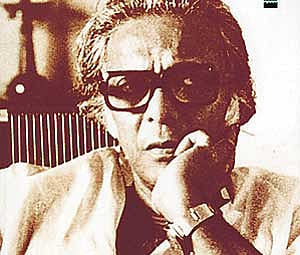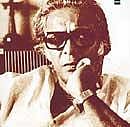
Mrinal Sen is full of energy and enthusiasm. Not that the octogenarian icon is planning to go on floors again. He is getting ready to be present at the Cannes Film Festival this May where a retrospective of his Kolkata trilogy — Calcutta 71, Interview and Padatik — is to be held.
Dressed as usual in white casuals, Sen is in a relaxed mood at his South Kolkata residence. Sipping on a cup of green tea, he says, “Last year, my retrospective at Cannes had to be cancelled as the prints of my films were in very bad condition. Cannes does not accept video versions of films, only full length prints of features. So it is a tragedy that most of the classics in Bengali are in extremely poor condition. Neither the distributors nor the West Bengal government have taken any measures to restore prints of films by Pramsthesh Barua, Durga Das Banerjee or even some by Tapan Sinha, Ajay Kar and Rajen Tarafdar.”
After Satyajit Ray won a Lifetime’s Award at the Oscars prior to his death, special initiative was taken by Ismail Merchant, James Ivory, Sir Richard Attenborough and Francis Ford Coppola to make the Academy Of Motion Pictures restore the prints of all his masterpieces. “Sadly, it hasn’t been the same for me. Many of the senior filmmakers and some of my contemporaries have been equally unlucky. I am not venting my frustration by the fact that my films have not been preserved by the Academy. Ours is a nation which has no respect towards preserving arts and culture.”
After reports of Sen’s films missing the Cannes retrospective, the Prime Minister’s Office instructed the I & B Ministry to take up the matter seriously, and ordered the national film archives of India to preserve and maintain the prints well. Sen adds, “I have learnt from Govind Nihalani and others associated with the archives that restoration of film prints of mine are almost complete. Cannes is the Bethlehem of cinema and who on earth would like to miss out on a retrospective there?”
Assures Govind Nihalani, “We will do our best to preserve the prints of all of Mrinalda’s films as they are assets to the nation. I’ll be happy if his retrospective does take place at Cannes this year.” In the competitive section of Cannes, the two Indian names still taken with most respect are those of Ray and Sen. Sir Richard Attenborough recently said, “After the works of Ray, Mrinal’s work must be showcased to the contemporary international audience to prove that India is not only the nation of slumdogs. There is much more to this vast nation.”
Shares Sen, “I served as a jury member at Cannes twice and two of my films, Kharij and Khandahar, won awards there. I would love to go back to Cannes again, to interact with sensible film lovers from all over the globe.”
Sen also recalls his term as jury member of the Tokyo Film Festival in 1994. He laughs, “I had strong differences with renowned director Sir Alan Parker and another jury member regarding awarding a short Japanese film. He was adamant on his stance but like a pleasant surprise, Gregory Peck came to my rescue and supported me openly. In Peck I found not only an excellent actor and human being but also someone who was impartial and understood the language of cinema very well.”
It is well known that Ray and Mrinal Sen had ideological differences regarding each other’s films. “There were creative differences. He criticised my Akash Kusum, terming it a crow film. He also ripped apart Ek Din Pratidin and Ek Din Achanak. And I openly voiced my dislike for Abhijan, Aranyer Din Ratri and Ganashatru. But he was never my enemy or rival. I still consider Ray’s Aparajita, Devi and Jana Arayna as masterpieces and acknowledge him as one of the greatest directors of the last millennium,” explains Sen.
The leftist director is not hopeful about modern Bengali cinema though. He laments, “From the films I’ve watched over the past five years, there are no Bengali films worth mentioning, except Kaal Bela. The quality of Bengali cinema has deteriorated greatly in recent times. Mere technical development is not enough for honest and good cinema. Having no contact with their audience, the present directors are self-centred and thus not confident to experiment. They cater only to multiplex-oriented, contrived viewership. It’s ridiculous.”
Does he plan to wield the megaphone again? Sen laughs at the question and says, “Every morning ,I have an inner yearning to start a new project. Ideas fill up my mind. But I am yet to decide on a particular issue which will form the backdrop for my next film.” Sen’s last film was Amar Bhuvan in 2002, not really a memorable film when compared to his other movies like Bhuvan Shomne, Akaler Sandhane and Khandahar.
Hollywood doesn’t interest Sen anymore. “I hardly watch any of the present Hollywood films which I have heard are more form-oriented as opposed to content. One no more comes across a Gone With The Wind, Brief Encounter or How Green Was My Valley. In comparison, films from Greece and Eastern Europe are far more appealing, artistically,” says Sen.
Sen hates to be termed a political filmmaker as he has transcended many boundaries in filmmaking and considers the term political, prostituted. He adds, “I may be a highly adored director in India. But I am nowhere yet, compared to Sir Charles Chaplin, Vittorio D’ Sica and Jean Louc Goddard.”

